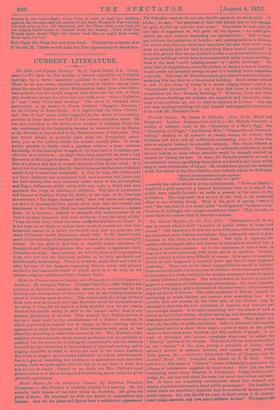Model Houses for the Industrial Classes. By Barrister Fletcher. (Longmans.)—Mr.
Fletcher is certainly entitled to a hearing. He has actually built houses of the kind which he describes. He gives the plans of them. He furnishes us with the details of expenditure and income. And all the plans and figures have a satisfactory appearance. The difficulty—and we do not see that he meets it—is about land.
advise," he says, "the purchase of land well placed, and so will assume we give £1,000 an acre for four acres." Afterwards he says, and for the sake of argument we will grant all his figures, " we could give £3,685 per acre without increasing our ground-rents." But we have got to house the population of London ; and, putting aside as a chimera the notion that they can be housed anywhere but near their work, what must we actually give for land in anything like a central position ? It is on this ground that we are inclined to take a more favourable view of the great buildings which have been constructed under various modifica- tions of the term "model lodging-houses" or "model dwellings." We allow that an Englishman naturally prefers to have a house to himself, would prefer his detached cottage to part of a building which resembles a barrack. But even Mr. Fletcher cannot give him his house to himself, assigning him one floor in a two-storied building. But it seems absurd to talk of the odium of living in a model lodging-house," and of an "ineradicable prejudice." Is it not a fact that there is a very brisk competition for the "Peabody Buildings "? However, there are other places where dwellings for artisans are required, and where the condi- tions of the problem are not so hard as they are in London. Any one who may meditate building will find himself well repaid for his trouble if he reads Mr. Fletcher's book.


































 Previous page
Previous page